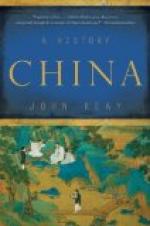Thus the collapse of the Mongols came for the following reasons: (1) They had not succeeded in maintaining their armed strength or that of their allies during the period of peace that followed Kublai’s conquest. The Mongol soldiers had become effeminate through their life of idleness in the towns. (2) The attempt to rule the empire through Mongols or other aliens, and to exclude the Chinese gentry entirely from the administration, failed through insufficient knowledge of the sources of revenue and through the abuses due to the favoured treatment of aliens. The whole country, and especially the peasantry, was completely impoverished and so driven into revolt. (3) There was also a psychological reason. In the middle of the fourteenth century it was obvious to the Mongols that their hold over China was growing more and more precarious, and that there was little to be got out of the impoverished country: they seem in consequence to have lost interest in the troublesome task of maintaining their rule, preferring, in so far as they had not already entirely degenerated, to return to their old home in the north. It is important to bear in mind these reasons for the collapse of the Mongols, so that we may compare them later with the reasons for the collapse of the Manchus.
No mention need be made here of the names of the Mongol rulers in China after Kublai. After his death in 1294, grandsons and great-grandsons of his followed each other in rapid succession on the throne; not one of them was of any personal significance. They had no influence on the government of China. Their life was spent in intriguing against one another. There were seven Mongol emperors after Kublai.
6 Cultural
During the Mongol epoch a large number of the Chinese scholars withdrew from official life. They lived in retirement among their friends, and devoted themselves mainly to the pursuit of the art of poetry, which had been elaborated in the Later Sung epoch, without themselves arriving at any important innovations in form. Their poems were built up meticulously on the rules laid down by the various schools; they were routine productions rather than the outcome of any true poetic inspiration. In the realm of prose the best achievements were the “miscellaneous notes” already mentioned, collections of learned essays. The foreigners who wrote in Chinese during this epoch are credited with no better achievements by the Chinese historians of literature. Chief of them were a statesman named Yeh-lue Ch’u-ts’ai, a Kitan in the service of the Mongols; and a Mongol named T’o-t’o (Tokto). The former accompanied Genghiz Khan in his great campaign against Turkestan, and left a very interesting account of his journeys, together with many poems about Samarkand and Turkestan. His other works were mainly letters and poems addressed to friends. They differ in no way in style from the Chinese literary works of the time, and are neither better nor worse than those




